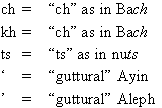|
Entries are listed alphabetically according to transliteration. Phonetic representations will use hyphens to separate the syllables. The accented syllable will be indicated with CAPS. Parts of speech are given in abbreviated form (e.g., n. for noun, adj. for adjective, and so on). Common English spellings are sometimes provided in the definition. If relevant, English Bible (KJV) scripture references are provided in parentheses.
Sample Entry:
Abba

(AHB-bah) Aramaic. n. Abba. "Daddy," "dear Father," "papa"; a term of endearment for one's father (Mark 14:26; Rom. 8:15; Gal. 4:6). Abba is a more intimate expression than the normal Hebrew word for "father" (av). Note that the dagesh in the Bet is forte since it is preceded by a vowel.
Locating Entries
Since entries are listed according to English transliteration rather than Hebrew script, locating an entry must be based on transliterated values. To find an entry, keep the following points in mind:
- For words that begin with Aleph or Ayin, the entry will be listed under the vowel sound associated with the letter (e.g., adon, elohim, igeret, ohel, and ulpan).
- For words that begin with Vet or Vav, check under V.
- For words that begin with Chet, check under Ch.
- For words that begin with Tet or Tav, check under T.
- For words that begin with Kaf, check under K.
- For words that begin Samekh or Sin, check under S.
- For words that begin with Tsade, check Ts.
- For words that begin with Qof, check either Q or K.
Note: Letters with a dagesh forte double their consonantal value but are often not so represented in conventional English transliterations. In general, this glossary follows the more common transliteration as used by North American Jews.
Vowel Sounds
For English transliterations (as opposed to phonetic representations listed in parentheses), Hebrew vowel sounds will be represented with the following letters:

The sheva will be transliterated using an apostrophe or "e" when it is vocal.
Consonant Sounds
The Hebrew consonants are represented using standard English letters. The following exceptions, however, should be noted:

Aleph and Ayin are often left untransliterated and are indicated by the vowel sound associated with them.
Jewish Literacy: 51 Words of Value
Words and definitions mean little apart from their historical and cultural context. In order to understand the meaning of a word, it's always good idea to understand both its history (etymology) and also its usage over the millennia. To expedite your level of literacy, I include Hebrew words/phrases that represent some Jewish values (middot halev).
Biblical Hebrew Vocabulary
Separate pages are provided for Hebrew words based on frequency of occurrence in the Tanakh. These words should be written down on flash cards and memorized as part of your ongoing study of Hebrew grammar.
Navigation Tip
For any page in the glossary section you can return to this page by simply clicking on the banner at the top of the page.
|



